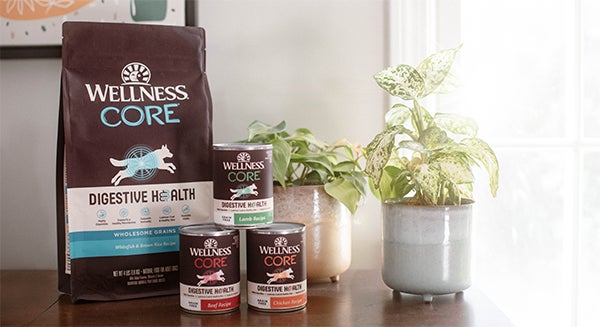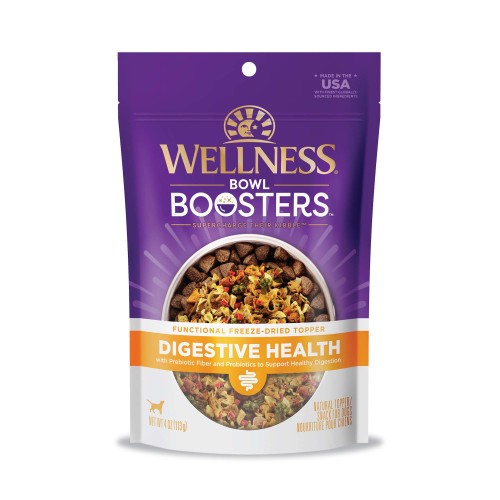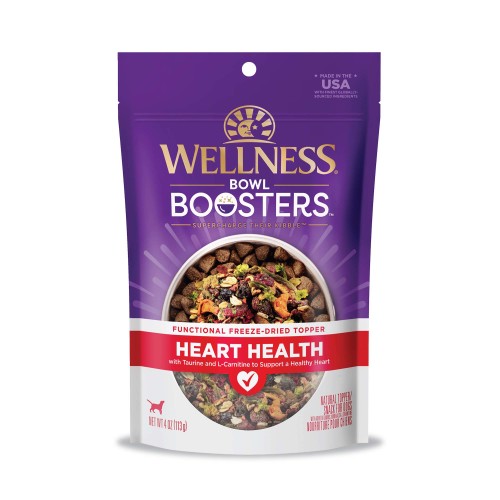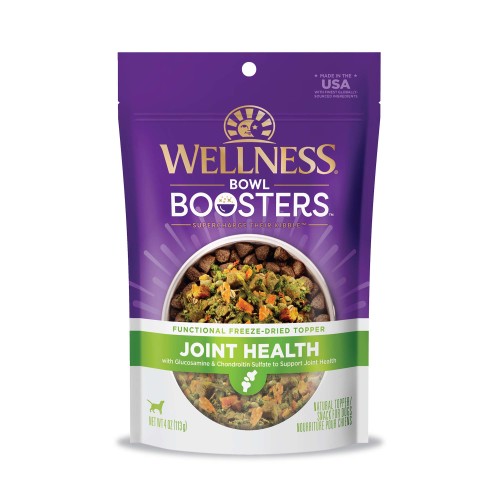February 3, 2021
Help! Why Is My Dog’s Stomach Upset?
Dogs are known to eat anything and everything if given the chance. For them, if it looks or smells even remotely edible, chances are it’s half swallowed before you can yell, “drop it!” It turns out that an upset stomach is one of the top unexpected reasons why dogs need to visit the veterinarian. While no pet parent wants to see their dog suffering from diarrhea, vomiting, constipation or any other type of digestive issue, knowing the signs and symptoms of upset stomach in dogs is key to identifying what is bothering your dog and how to help them.
What is a Digestive Stomach Upset?
Digestive (gastrointestinal) upsets are conditions that impair the ability of the stomach and intestines to digest and absorb all the great nutrients included in your dog’s food.
What is Healthy Digestion?
With healthy digestion, your dog can not only optimize their nutrient absorption to keep them in great condition, but the digestive system also helps support their immune health, promote healthy skin and coat and boost their vitality, making it key to fueling a lifetime of wellbeing.
Upset Stomach in Dogs – Symptoms:
- Vomiting
- Diarrhea
- Constipation
- Lethargy
- Weight loss.
If you think your dog is in distress or if their condition is not improving, we recommend you speak with your local veterinarian. Your veterinarian can perform an exam, diagnostics and recommend treatments specific to your dog to get them back to health.
Upset Stomach in Dogs – Causes:
With so many potential causes, diagnosing digestive problems in dogs can often be a difficult challenge even for your vet! To complicate matters even further, the digestive upset could originate in any part of your dog’s digestive system, from the mouth to the stomach, liver, pancreas and intestinal tract. Common causes of digestive upsets include:
- Sudden changes to their diet
- Dietary indiscretions
- Parasites
- Allergies
- Foreign objects
- Toxins
- Bacterial, virus or fungi
- Medications
- Genetics
Left untreated or in chronic cases, a dog can suffer dehydration, imbalanced electrolytes, weight loss and impaired nutrient absorption that could lead to malnutrition. In all these cases working with your veterinarian is essential to improve their wellbeing.
Upset Stomach in Dogs – Treatments and How You Can Help:
In an ideal world our dogs do not have any problems with their digestive systems, but of course you can’t always prevent illness. So what are the best ways to keep your dog’s digestive system healthy:
What to Feed a Dog with an Upset Stomach:
First and foremost, to avoid stomach issues and ensure the long-term health of your furry companion, make sure you are providing your pup with a high-quality diet. Wellness CORE Digestive Health recipes are highly digestible wet and dry foods that work great for dogs with sensitive stomachs; however, all dogs can benefit from a digestive health focused dog food. Wellness CORE Digestive Health recipes deliver guaranteed levels of probiotics, digestive enzymes and our unique blend of prebiotic fibers to support your dog’s whole body wellbeing through improved digestive health. These recipes are available in wet and dry options, as well as an option just for small breed dogs.

Treating an Upset Stomach
- Gradually transition to new foods. While it is tempting to feed various foods and treats to your dog, it is important to remember that most dogs are not accustomed to changes and these sudden differences in dietary moisture, fat, fiber, and even total calories can result in stool changes, potentially leading to diarrhea. Keeping foods consistent and gradually introducing new items is key to minimizing upsets.
- Look for a food with prebiotics and guaranteed probiotics to support your dog’s gut microbiome. The microbiome are the trillions of microorganisms living in your dog’s intestinal tract that work to keep your dog healthy. With a healthy microbiome balance, your dog is less likely to suffer a digestive upset and should they have an imbalance due to medications or dietary indiscretion then a diet that focuses on the microbiome will also help restore the balance to promote health.
- It’s near impossible to keep an eye on your dog every second of the day but watch out for what they eat when out on their walks in case they see something that looks extra ‘tasty’
- Keep rubbish, left over foods, table scraps and other indigestible materials out of reach to discourage them from having a nibble.
- If despite all your best intentions your dog does suffer a period of gastroenteritis you will want to treat it right away. Remember that the management of your dog’s digestion condition will depend on its severity and in all cases the best person to assist you is your local veterinarian.






